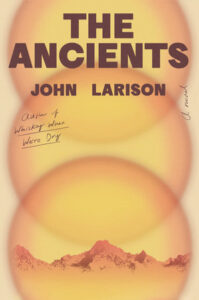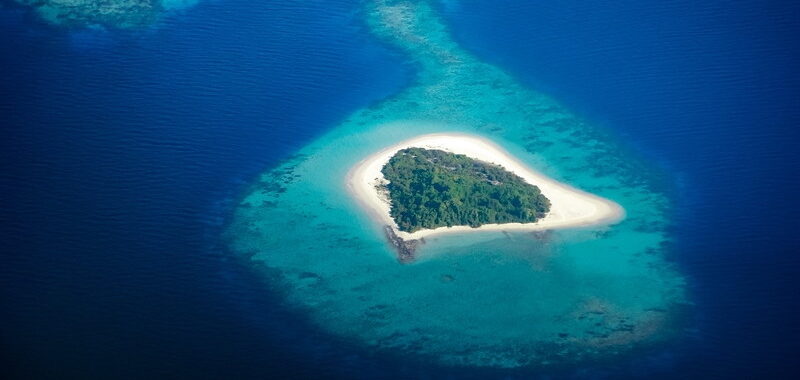Maybe all fourteen year-olds feel like they are living on an island—though in my case, the island was literally an island: a speck of limestone dressed in green jungle, part of the Micronesian archipelago, just north of the equator, in the middle of the moody, blue Pacific.
Article continues after advertisement
I’d resided on perhaps a dozen islands before this—some tropical, some frigid—as the child of National Geographic filmmakers. These were not tourist destinations, at least not yet. We lived in huts, tents, and bunkers. On Prince of Wales Island in Alaska, black bears ransacked camp at night. On Heron Island on the Great Barrier Reef, flightless birds had to be cleared from the kitchen with a broom. On Guam, poisonous brown tree snakes slept the day away in our bedding.
On-assignment, each of us had our job to do. My father, who wrote and directed and edited most of the films, also ran the 16 millimeter Arriflex cameras while my mother operated a boom and a heavy Nagra audio recorder. Since most of their films required the assistance of local populations, my brother and I were tasked with building goodwill and making new friends.
Perhaps by centering difference, we inherently draw attention to the author’s own biases—what they see as difference.
I brought a childhood of such experiences with me to Micronesia, where my parents would be soliciting local help as they attempted to film the astounding biodiversity of the reefs. We were staying in a dank research station built on a seawall along a secluded cove. Outside the front door stood a stone bunker constructed by invading Japanese forces ahead of World War II. In the water was a Japanese aircraft shot down when the Americans sought to make the island theirs. To those soldiers and airmen fighting and dying here fifty years earlier, the island must have felt like the middle of nowhere, while to those locals sheltering from someone else’s war, it was—and still is—the center of the universe.
The first friend I made on the island was not local. He was a Japanese graduate student named Yuki there for a season of research. He came to the water’s edge in the evenings and donned a mask, fins, and tank and dove for his dinner. Yuki spoke no English and I spoke no Japanese, and he must have been ten years older than me, and yet there we were, each night, on the seawall. He noticed my interest in his spear-gun. One evening, with smiles and hand gestures, he invited me to swim with him. With a mask and snorkel, I followed over top as he used his SCUBA system to hunt fish along the coral of the bottom.
The next evening, Yuki came with a snorkel instead of a tank, and this time, we swam together, drawing deep breaths and kicking down on the quiet power of fins. He let me have a turn with the spear-gun. I remember the two of us diving to a mass of coral the size of a small house. He went one way around the wall of purple and pink textures while I went the other. A midsized parrotfish—which use their beak-like mouth to bite the coral and chew it for the organisms inside—scurried along ahead of him and directly into the path of a spear I sent.
As darkness came we returned to shore together, and Yuki used a fillet knife to divide the catch between us. Over that fish, we smiled at one another. When it was time to go, he bowed and I felt like I should do the same. It was a little awkward, and we laughed. Though we didn’t share language or culture, we were both grateful to have a friend so far from home.
Not far from the research station was a village of a few hundred locals, most of whom lived in houses constructed of concrete and scrap metal. At noon, young men dressed in baggy shorts and T-shirts gathered on the seawall with a casting net. A well-timed toss would trap a few hundred silver fish the length of a finger, and the guys would carry the wiggling mass to the shade and sit together to lift fish still kicking, dip them in soy sauce, and deliver them to their mouths. This was lunch.
One day they saw me watching. My face flushed, but the net-thrower waved me over. He spoke English, but he couldn’t understand much of my accent and I couldn’t understand much of his. I sat with them, and though I wasn’t sure about eating an alive creature, my mother had taught me never to be too snooty for the gift of food. The young men laughed to watch me struggle with a fish, but I got it dipped in the sauce and on my tongue, and was surprised to find it delicious, crunch and all. I went for another, and the guys cheered.
After a few days of sharing lunch like this, I worked up the nerve to ask Ruby, the net thrower, about spear-guns. Did he have one? Could I trade for it?
That afternoon, on Ruby’s invitation, I found myself in a home in the village, watching old men shape a chunk of wood and weld a barb on a pole of metal, making a spear-gun from scratch. These men were of the older generation; they had known the Japanese invasion and could still speak that language. If they spoke English, they didn’t speak it with me. But as they worked, they offered me what they were chewing, betel nut, a stimulating habit akin to chewing tobacco. As they directed, I tucked the half-nut dusted with lime in my cheek. At once, my mouth caught fire. The men laughed when I ran to spit the nut out.
For the gift of the finished spear-gun, I gave them the silver Minolta camera I had bought with my own money in the States and several rolls of 35 millimeter film. A few days later, when I finally speared a fish, I brought it by to offer the men, but no one was home.
Some weeks went by. One day, I was on the seawall with Yuki preparing to dive when we heard yelling up the cove. I thought someone was drowning. We ran to find Ruby pointing at a mass of coral off shore, where one of his friends was coming up for air.
“Octopus!” Ruby said with so much excitement. To the locals, octopus was the most prized catch of all, but they are usually too smart for one diver to capture alone. The guys needed our help. Yuki and I dove.
This particular octopus would escape us, but for a few minutes there we were, young people drawing deep breaths together and finning down in unison.
These memories are always close by for me, but I found myself returning to them with new intention while writing the early drafts of my novel, The Ancients, which seeks to find the happy ending in humanity’s deep future. In the book, characters from divergent cultures are thrust together by a changing environment.
*
Writing across difference is often maligned in contemporary conversations of literary craft—and for good reason—but I am of the opinion that the skill, in some form, is an essential one for any novelist. Even the writer of autofiction sometimes needs to write beyond their own boundaries and breathe life into characters who are not them. Yet writing across difference is undeniably risky. To do it ethically requires clear intention and self-awareness.
I don’t build characters anymore. Instead, I transcribe people’s voices, those they speak to others but especially those they speak only to themselves.
Too often, writers center the difference itself. We look at the character in our mind and see what is unique and different about them, and we try to compel the reader into believing in the character by emphasizing their difference. But this approach is flawed. Perhaps by centering difference, we inherently draw attention to the author’s own biases—what they see as difference.
This method failed spectacularly in the early drafts of The Ancients, whose characters are separated from the writer and the audience by several millennia of human history. I knew this book would require a different approach to building character.
One morning, while pacing around my office, I remembered my friends in Micronesia. How was it that we had gotten along so well despite our profound differences?
It occurred to me that I had been too young then to think of Yuki as a “Japanese man”; I thought of him as a friendly person who liked to spearfish. And maybe I had been too naive to see Ruby as the local descendent of survivors of World War II or as an indigenous person struggling to find his way in a Westernizing world; I thought of him as a super outgoing guy with great friends.
I threw out the bad draft and started over with a blank page and a new rule. I wasn’t going to write representatives of an identity I didn’t share.
Yet soon I found myself hung up again, this time on the barb of a simple but impossible question: What makes a person a person if not their identity?
I don’t know the answer to that question in real life, but I discovered an answer that works on the page. In a story, a person is someone who seeks connection but confronts disconnection; a person is someone who wants two mutually exclusive outcomes at the same time; a person is a mystery to themselves.
By now, even the word “character” has become a step too far for me. Characters are inherently made up; characters are a compilation of characteristics. When I think of my people as characters, I am immediately outside of them; I immediately doubt their humanity. So I don’t build characters anymore. Instead, I transcribe people’s voices, those they speak to others but especially those they speak only to themselves.
These days when a story demands I write across difference, I remember Yuki inviting me to swim; I remember Ruby cheering when I dipped another wiggling fish in soy sauce; I remember holding my breath and feeling my lungs burn as I reached a little farther into a crack in the coral for what would elude us—and instead of writing difference, I write connection.
__________________________________

The Ancients by John Larison is available from Viking, an imprint of Penguin Publishing Group, a division of Penguin Random House, LLC.

